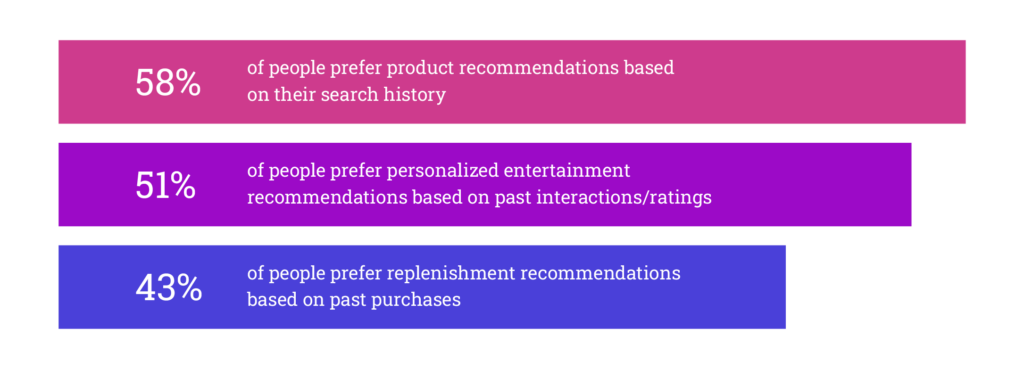Artificial intelligence (AI) has been a boon for marketers and data professionals. The ability to analyze and process millions of data points in a matter of seconds has opened new doors for richer insights, improved ROI, and better decision making in near real time.
How companies are applying AI across their businesses is expanding as well, with the development of new products and services intended to delight customers and make internal teams more efficient. According to Treasure Data research on customer data maturity, 85 percent of organizations are somewhat or extremely likely to add customer analytics using AI/ML and predictive capabilities to their data strategies throughout 2022.
Where else is AI making an impact? We asked marketing leaders to share how AI has impacted the way they view marketing, and how the technology is transforming the industry. Here is what we found:
1. AI Unlocks New Perspectives
AI offers speed to insight, but it can also reveal nuances in data that may have previously gone unnoticed. This capability allows organizations to identify trends, close gaps, and identify target audiences in a way they may not have been able to do before, without the help of advanced technology.
“With the help of AI, data professionals can now identify patterns and correlations that were previously hidden,” Kevin Joubin, VP, growth marketing, Branded Surveys, said. “This allows them to make informed decisions about targeting marketing efforts and optimizing customer journeys.”
2. AI Connects First, Second, and Third-party Data
Data is now collected from more touch points than ever before. When layered alongside systems like a customer data platform, AI can quickly ingest, consolidate and analyze data from across previously disparate sources to keep unified customer profiles updated and accurate in near real time.
“I think there’s a lot of different ways to apply it – the fact that you can teach the machine to learn and figure out patterns that you and I wouldn’t be able to figure out,” Anthony Manson, CDO, WebMD Medscape, said. “We have tons of data in healthcare, whether it’s first-party or third-party. Being able to have AI and machine learning determine what patterns they’re seeing, I think, is critical.”
3. AI Helps Marketers Understand Customers
Connecting these data points is critical to truly understanding customers, and their unique customer journeys. According to Dale Tuck, CITO, Primerica, having an active and ongoing understanding of the customer opens new doors to more proactive and engaging messaging.
“If we have a good understanding of who our customer is, and we understand the interactions that that person has had – whether it’s within our ecosystem, or outside of our ecosystem…if you can marry who that person is, and what about them you need to know with those external datas, you’re able to start doing the magic of being able to talk to that person in the right context at the right channel at the right time, with the right message – and that will drive up the engagement,” he said.
4. AI Allows For New Customer Experiences
It’s not just messaging that improves, says Gauri Manglik, CEO & co-founder, Instrumentl. Understanding customer preferences and prior interactions can also help marketers predict the next-best action to take, or what products or services should be recommended to different customers. This can help improve loyalty, retention and overall customer lifetime value.
“For example, imagine a company that sells products with different price points. One product may be aimed at people who want lower prices but want a premium product. Another might be aimed at people who want higher prices, but don’t care about quality as much,” Manglik said. “These companies could use AI to recommend which customers should be sent which product based on their preferences, age range, and other factors—and ensure that all customers get exactly what they want out of each purchase.”
Consumers are open to AI-powered recommendations, too. According to our 2022 consumer survey on AI in marketing, 58 percent of people said they want companies to offer product recommendations based on their search history, and 51 percent prefer entertainment recommendations based on things they’ve liked or watched before.

5. AI Humanizes Marketing with Personalization at Scale
Getting down to a personal level with a broad customer base seems like an unfathomable challenge if you’re doing it manually. But AI allows marketers and data teams to drill down while also widening their reach to deliver contextual experiences at scale.
“AI will allow marketers to manage very personalized targeting on a large scale,” Chloe Addis, head of marketing, Headley Media, said. “Brands will be able to create seamless and personalized customer journeys across platforms that are precisely tailored to the individual customer and their wants, then sell to them at exactly the right time.”
In a way, Addis adds, AI is helping marketers take a more “human” approach.
“It’s almost ironic that many of these technological advances on the horizon will be used to humanize marketing communications and personalize the customer experience of big brands,” she said.
6. AI Makes Teams (and Experiences) More Efficient
A great example of humanizing marketing with tech is through chatbots. According to Boris Jabes, CEO and co-founder of Census, chatbots not only provide better customer experiences, but can make sales, marketing and customer service teams more efficient too.
“Many businesses are already using chatbots to automate customer service tasks, such as answering common questions, providing customer support, and taking orders – and even more complex ones like fraud detection or financial analysis,” Jabes said. “These bots can accomplish these tasks much quicker than humans, so customers can immediately get the answers or assistance they need. In addition, bots can work 24/7, so businesses can provide customer service around the clock. Using chatbots also frees up time for employees to focus on other crucial tasks, like product development or market research.”
Looking Ahead
As we look ahead, there’s plenty of opportunity for organizations to continue to advance their AI capabilities. But one thing you can’t forget is the human touch, says Flynn Zaiger, CEO, Online Optimism.
“As advanced as artificial intelligence has gotten over the past few years, it still needs a human touch to ensure that the world is up to the standards of most marketing clients,” he said. “But it’s progressing at a rapid pace, and if you’re in the marketing industry, you need to at least be following along with AI so you understand how to best utilize it in your career.”
Want to learn more about how marketers are using AI today? Check out the Top 4 Enterprise AI Trends for 2022.



